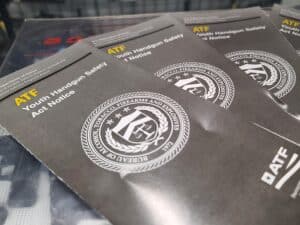The ATF will not be allowed to enforce its attempt to redefine what counts as a firearm while it appeals a lower court ruling.
On Monday, a three-judge panel for the Fifth Circuit Court of Appeals denied the agency’s request for a stay in VanDerStok v. Garland. The ATF was hoping to see a lower court decision vacating its rule on unfinished frames and receivers put on hold. That way it could continue regulating the parts, which are often used to build homemade firearms or “ghost guns” as President Joe Biden often labels them.
“Because the ATF has not demonstrated a strong likelihood of success on the merits, nor irreparable harm in the absence of a stay, we DENY the government’s request to stay the vacatur of the two challenged portions of the Rule,” the panel wrote in a per curiam opinion. “This effectively maintains, pending appeal, the status quo that existed for 54 years from 1968 to 2022.”
The unsigned opinion deals yet another blow to the Biden administration’s attempt to enact gun control by executive action. It signals that the Fifth Circuit is likely to cast a skeptical eye toward the ATF’s ability to broadly interpret longstanding federal law to cover novel areas of gun policy. That could have far-reaching ramifications beyond unfinished gun parts for everything from bump stocks to pistol braces.
Furthermore, so long as a court above the panel doesn’t intervene, the denial of the stay will continue to allow manufacturers to sell unfinished parts and build kits in states where they are not regulated.
Erik Longnecker, a spokesperson for the ATF, declined to comment on the decision, citing agency policy against commenting on litigation.
Gun-rights advocates celebrated the Fifth Circuit’s order. The Second Amendment Foundation, a plaintiff in the case, said it “bodes well” for the group and its members.
“We’re delighted the court ruled in favor of our challenges to the Biden administration’s overreach, and we will pursue this case to its ultimate conclusion,” Alan Gottlieb, the group’s founder, said in a statement.
The ATF’s stay request came after U.S. District Judge Reed O’Connor ruled earlier this month that the agency had exceeded its statutory authority when it attempted to redefine unfinished firearm frames and receivers in order to crack down on homemade guns and parts kits.
“[T]he definition of ‘firearm’ in the Gun Control Act does not cover all firearm parts,” O’Connor wrote in his opinion. “It covers specifically ‘the frame or receiver of any such weapon’ that Congress defined as a firearm. And that which may become or may be converted to a functional receiver is not itself a receiver. Congress could have included firearm parts that ‘may readily be converted’ to frames or receivers, as it did with ‘weapons’ that ‘may readily be converted’ to fire a projectile. But it omitted that language when talking about frames and receivers.”
O’Connor vacated the ATF’s rule in its entirety and declined to stay his decision while the appeals process played out but gave the agency five days to request one from the appeals court. The ATF did exactly that, but the agency was mostly rebuffed.
While the Fifth Circuit judges denied the agency’s request to stay the most consequential provisions of the ghost gun rule, they did agree with the ATF that the lower court decision was too broad when it vacated the rule in its entirety. The panel noted there are some other provisions of the rule that might survive scrutiny.
“The district court analyzed the legality of only two of the numerous provisions of the Rule, which contains an explicit severability clause,” the judges wrote. “Where a court holds specific portions of a rule unlawful, severance is preferred when doing so ‘will not impair the function of the [rule] as a whole, and there is no indication that the regulation would not have been passed but for its inclusion.’ Because the agency has shown a strong likelihood of success on its assertion that the vacatur of the several non-challenged parts of the Rule was overbroad, we STAY the vacatur, pending appeal, as to the non-challenged provisions.”
The panel also issued an order expediting the appeals schedule and stayed its own decision for ten days to allow the ATF to appeal further.






